Retention Rates On Steemit - Steemit Business Intelligence
It’s been a while since we visited the data retaining to Retention on Steemit. After bumper months of user registration in December, January and February, we are set to have another record month in March. But with all of these new users – how many are sticking around?
In addition to having bumper months for user registration, we have also experienced a pump on both the price of STEEM and the price of SBD. Now that this is subsiding could we see a decrease in retention?
Aim of Analysis
The Aim of this analysis is to carry out an in-depth study of retention on Steemit
We will analyse overall retention, author retention and voter retention.
By the end of this analysis and report we should have an accurate calculation of the retention rates on Steemit.
To see if the reduce price of both SBD and STEEM has effected the retention.
For more details on the data and the query please see the end of this post.
The Analysis
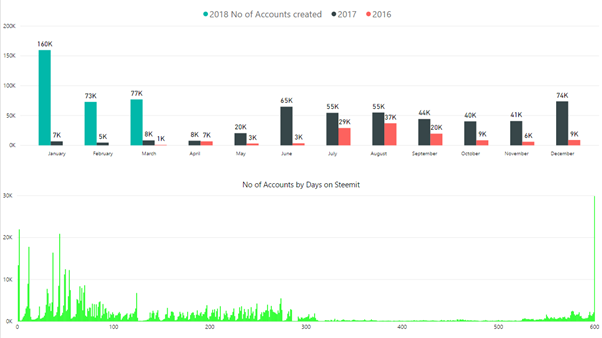
The top chart above shows the number of new users registering on Steemit for each month in each year. Below this we can see the age of the accounts on Steemit. From these we can see that around 300 days ago, so May – June 17 there was an increase in the number of accounts. We can also see a further increase around 120 days ago, in Dec 17.
Overall Activity
Overall Activity includes posting, commenting and also voting.
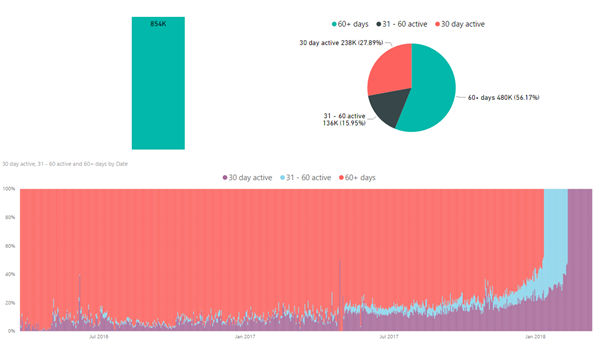
There are 845K accounts on Steemit, all of which have been active at some stage. Active by way of votes or posts or comments.
Almost 28% of accounts have been active in the last 30 days. 16% in the last 31-60 days and 56% have not been active in the last 60 day.
As the above data also include accounts create both this and last month, these accounts distort the level of retention. To adjust for this I have further filtered the data to exclude any accounts set up after 1 Feb 2018.
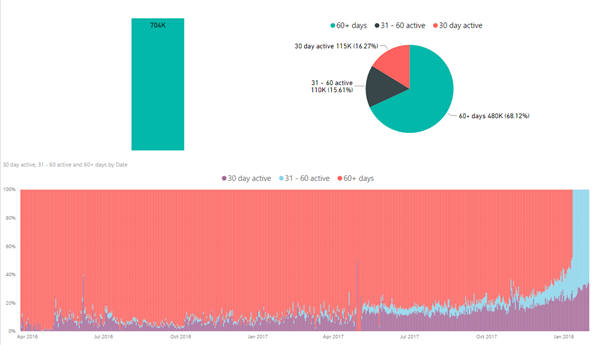
With this further filter added to the data we can now see that only 16% of account registered before Feb 18 have been active in the last 30 day and this would be a true reflection of 30 day retention on Steemit.
Author Retention
Author retention is based on both post and comments.
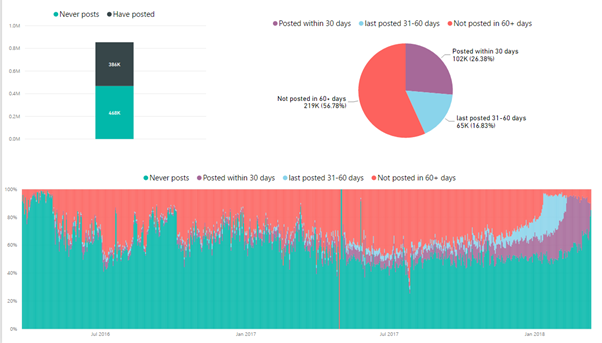
Of the 854K accounts, 55% have never posted. Of the 45% that have posted 57% have not posted in the last 60 days and only 26% of the 45% have posted in the last 30 days. That’s 12% of total accounts that have posted in the last 30 day.
However these values include accounts registered this month and last month and due to this, do not give an accurate reflection of retention.
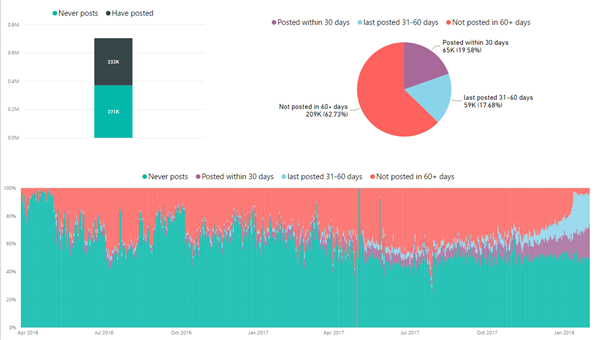
By removing accounts registered before Feb 18 we can now see that 53% of accounts have never posted and 47% of account have posted. Of this 47% less than 20% have posted in the last 30 days. In fact only 9% of accounts registered before Feb 18 have posted or commented in the last 30 days. This is a true reflection of author retention on Steemit.
Author Drop off
The chart below plots the number of days since last post against the days registered. The deeper the color the greater the number of accounts. This chart shows the high drop off on registration in purple on the right of the chart, these are the accounts that never posted. We can also see a dark cluster on accounts less than 100 days old and this dark patch fades as we move up towards 300 days.
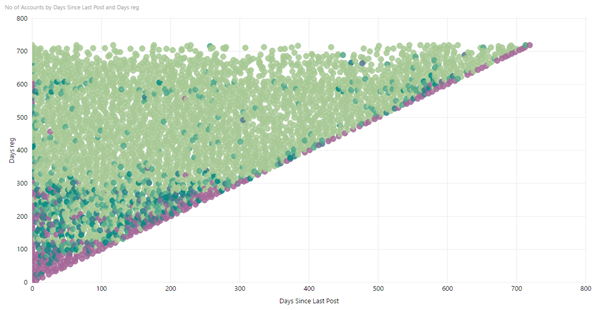
Voting Retention
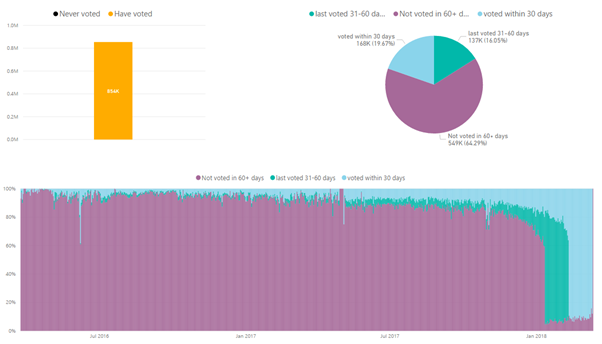
We can see from the visualizations above that all accounts have voted at some time. 19.6% have voted in the last 30 days. 16.5% have voted between 31 and 60 days ago and 64% have not vote in the last 60 days.
These values include accounts registered this month and last month, which would distort the voter retention rate. By excluding accounts set up after 31 Jan 18 we can get a more accurate reflection of voter retention.
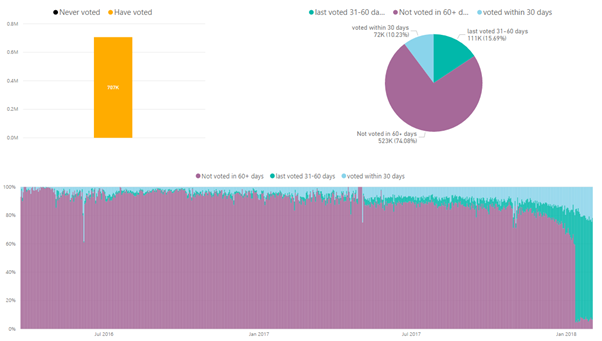
We can see now that the voter retention for 30 days is 10.2% and 74% of accounts registered before 1 Feb 18 have not voted in the last 60 days.
10.2% is an accurate reflection of Steemits 30 day voter retention.
Finally I was interested in looking at accounts that registered between Nov 17 and 31 Jan 18. These accounts are of particular interest because the price of both STEEM and SBD had a nice pump. However in more recient times we have seen the price of both STEEM and SBD reduce.
Below we can see the data for accounts set up during Nov and Jan
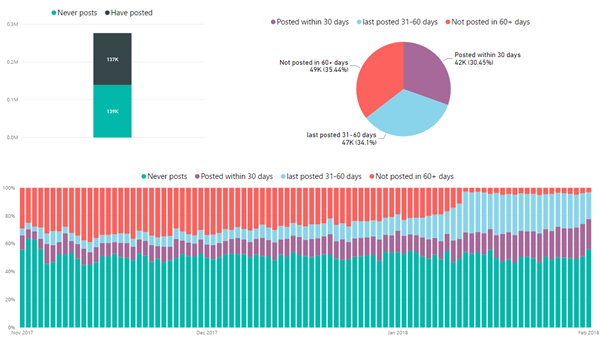
Almost 50% of accounts have posted and to my surprise 35% of accounts have posted in the last 30 days. That’s a retention of 17.5% on accounts that registered on Steemit while the price of STEEM was high. I was expecting to see this lower than the overall retention. The reason for my thinking was that many people come to Steemit to make a few quick $$$. Now that the price is down, posting might not seem so worthwhile. I am happy to see my thoughts are not correct.
Conclusion
Author retention on Steemit is only 9% and voting retention of 10%. Overall retention is 16%. There also appears to be an increase in retention in the last 4 months, despite the recent downturn in the price of STEEM and SBD.
Are you surprise with these figures? Do they disappoint you? How do you think we can increase the retention on Steemit? All comments welcome below
Data and query
The data was collected for this query on 13 March 18. Power BI was used to connect with SteemSQL
The full M query used to get and transform the data was
let
Source = Sql.Database("vip.steemsql.com", "DBSteem", [Query="Select *#(lf)From Accounts (NOLOCK)"]),
#"Removed Other Columns" = Table.SelectColumns(Source,{"id", "name", "created", "last_vote_time", "last_post", "last_root_post"}),
#"Split Column by Position" = Table.SplitColumn(Table.TransformColumnTypes(#"Removed Other Columns", {{"created", type text}}, "en-IE"), "created", Splitter.SplitTextByPositions({0, 8}, true), {"created.1", "created.2"}),
#"Changed Type" = Table.TransformColumnTypes(#"Split Column by Position",{{"created.1", type date}, {"created.2", type time}}),
#"Renamed Columns" = Table.RenameColumns(#"Changed Type",{{"created.1", "created date"}, {"created.2", "created time"}}),
#"Split Column by Position1" = Table.SplitColumn(Table.TransformColumnTypes(#"Renamed Columns", {{"last_vote_time", type text}}, "en-IE"), "last_vote_time", Splitter.SplitTextByPositions({0, 8}, true), {"last_vote_time.1", "last_vote_time.2"}),
#"Changed Type1" = Table.TransformColumnTypes(#"Split Column by Position1",{{"last_vote_time.1", type date}, {"last_vote_time.2", type time}}),
#"Renamed Columns1" = Table.RenameColumns(#"Changed Type1",{{"last_vote_time.1", "last_vote_date"}, {"last_vote_time.2", "last_vote_time"}}),
#"Split Column by Position2" = Table.SplitColumn(Table.TransformColumnTypes(#"Renamed Columns1", {{"last_post", type text}}, "en-IE"), "last_post", Splitter.SplitTextByPositions({0, 8}, true), {"last_post.1", "last_post.2"}),
#"Changed Type2" = Table.TransformColumnTypes(#"Split Column by Position2",{{"last_post.1", type date}, {"last_post.2", type time}}),
#"Renamed Columns2" = Table.RenameColumns(#"Changed Type2",{{"last_post.1", "last_post"}, {"last_post.2", "last_post.time"}}),
#"Split Column by Position3" = Table.SplitColumn(Table.TransformColumnTypes(#"Renamed Columns2", {{"last_root_post", type text}}, "en-IE"), "last_root_post", Splitter.SplitTextByPositions({0, 8}, true), {"last_root_post.1", "last_root_post.2"}),
#"Changed Type3" = Table.TransformColumnTypes(#"Split Column by Position3",{{"last_root_post.1", type date}, {"last_root_post.2", type time}}),
#"Renamed Columns3" = Table.RenameColumns(#"Changed Type3",{{"last_root_post.1", "last_root_post"}})
in
#"Renamed Columns3"
After this a series of DAX calculations were used to compute days different between today, account creation date, last post-date and last vote date.
I am part of a Blockchain Business Intelligence community. We all post under the tag #BlockchainBI. If you have an analysis you would like carried out on Steemit or Blockchain data, please do contact me or any of the#BlockchainBI team and we will do our best to help you...
You can find #BlockchainBI on discord https://discordapp.com/invite/JN7Yv7j
Posted on Utopian.io - Rewarding Open Source Contributors
Thank you for the contribution. It has been approved.
Hi @paulag, wow, I wouldn't have expected that the retention rate is below 10%, but it's great to see that the trend is rising!
To include accounts that only trade or transfer STEEM/SBD, you could also look at
last_bandwidth_update. This should indicate any activity on the blockchain.You can contact us on Discord.
[utopian-moderator]
I didn't consider transfers, thanks for that. When I revisit this in a few months I will include it as part of the analysis
Hey @crokkon, I just gave you a tip for your hard work on moderation. Upvote this comment to support the utopian moderators and increase your future rewards!
Everytime I see a copy/pasted meme hitting $46, I die a little inside.
The numbers don't look good.
You should analyze the waiting periods for the account approval and their effect on the retention. When I've joined in January this year, I've waited about three days. Two guys I persuaded to join waited for over two weeks in February.
One lost interest completely, didn't even bother to vote or post anything. The other wrote the intro post, got "Welcome Message" by the bots, saw what's trending and lost his interest.
what you have mentioned I am hearing myself and yes these sign up problems are for sure part of the problem
It's a little disappointing. Not sure if this relates to churn rates of the more traditional social media sites - those rates are in the 20-30% range. Is it totally related to the price of Steem/SBD? Or more related to posting and not getting the magic upvotes. 55% having never posted is crazy. Is that related to the delay in getting an account... sign-up and forget about it, never come back.
Interesting information @paulag, thanks for pulling it together.
When talking about the issue of account retention, never forget that a good portion of account creation goes to bots, which are either designed to never post and only vote (for money) or never vote and only post (content formed off the web or generated by Markov chain).
It's probably impossible to determine if any given account is a bot or not without specifically looking at their pattern of engagement, but we know they exist and they exist in numbers.
in massive numbers.....
If I was prone to scatological communication, and I am, I would say "in pant-shittingly massive numbers, far beyond the numbers of mortal ken."
But we can't know that for sure. We can just look at the behavior of these accounts and wonder.
Though it is a little comforting to think that at least most of the accounts which were created and have done nothing since might have been for bots that the author has forgotten about, which is good.
I have a very fuzzy prediction which I would be happy to discover was wrong, that the more activity around SMT and the upcoming hardfork in terms of PR and social push, the more accounts that we're going to see getting pushed to be created with the Steemit-delegated SP, purely to act as batteries to be used for something in the future, after the fork.
I would love to be proven wrong, but we'll see if reality catches up to me.
But here is the paradox.
We have lots of New accounts being created, but How much of them are from different person?
The system as It is make It profitable to have a circle vote of multiple accounts, and delegate the sp around these accounts.
At First the vp/sp stay the same, but since each circle vote would increase each account Power, this might grow exponetially...
I might be wrong though. I Just thought about this...
there will always be an element of scam. I do a new user report each month and one of the things I look at is the % of accounts that complete their about me section or add an external link to their profile. I use this to judge the quality of the users joining and it is the closet % to retention and a very good indicator of user quality
churn is the opposite to retention and a google search will give you the answers. Steemit is way off at the moment
@paulag Your posts are always timely. This one is especially so. Your stats support my observations, as last evening I posted an original and it landed second place on the "New" page. I refreshed; and it still remained in the top 5 or so.
I can remember when people complained about being dumped in the ocean of minnows and their posts never getting seen....As I write this I am thinking my how things have changed. (lol)
I'm also reminded how @haejin, et al are blamed for hogging the platform; but, it seems without their activity Steemit might just be a huge tumbleweed.
This reminds me...Change when needed is good.
Thanks again!
Best regards.
Peace.
Thank you for posting your M query. That's another info I haven't been sharing in my analyses. Will share it on my succeeding ones.
Retention metrics are interesting, but what I'd find more interesting is whether these "new" accounts get Steem assigned to them from other sources to serve as auto-upvote reward pool gaming accounts.
That would show the true nature of the cancer of "new" sign ups.
I do a report each month on new sign ups and try find accounts with suspicious activity. You should check it out
Great work yet again @paulag
I do find it disappointing to have such a low retention rate. There are a number of problems on the platform and engagement/support of new users is one of them.
I've started a mentoring project for one community that I'm involved in. Too early to generate any data from it and still a very small sample, but retention of new users to this community is one of the goals.
My hope was that if the mentoring concept works then it might be adopted in other community groups.
communities are key. From other studies and analysis I have done, it seems if you are not part of a community that support each other via votes, then you are fighting a loosing battle
Fantastic work as always :)
Any idea how these figures stack up against legacy site results?
(Imgur, 9gag, facebook, Reddit etc.)
Is that info readily available and trustworthy?
It surprises me that 55% of accounts have never posted. That seems very high. I would have expected that people would post a bit in the beginning and then lose interest, but not that they would go to the bother of registering and then never even do one post.
Not really surprising. Probably most of these 55% are multiple accounts per user, used to upvote one person, or flag.